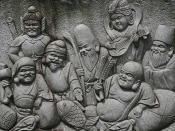In this essay, I am going to look at both sides of the argument for whether belief in God makes sense in the modern world. I am going to consider whether it is any different to 100 years or so ago, and similar issues.
First of all, I am going to consider why belief in God does make sense in the modern world. Joseph Addison claims "to be an atheist requires an infinitely greater measure of faith than to receive all the great truths which atheism would deny." But what evidence is there for the existence of God?
Firstly, there is creation. Psalm 19:1 says, "The heavens declare the glory of God; And the firmament shows his handiwork." Religious believers (particularly Christians) often argue that the world is just too complex to have been created by chance: this points to a Creator. They further might argue that the Big Bang is not proven, but just a Theory.
Professor Verna Wright, on being asked whether he would still be a Christian if Evolution was proved, responded "This is like asking 'If diseases were shown to be mythical, would you still be a doctor'". A watch has a maker, so surely the Earth does as well. Creation is one of the strongest pieces of evidence that religious people use.
Secondly, there is conscience. Ezekiel Hopkins once said, "There is a conscience in man, therefore there is a God in heaven." R.C.H. Lenski also said, "Conscience holds us accountable to God. Drop the idea of God and the vitality of conscience is destroyed. Mere abstract of 'right' and 'wrong' do not bind the conscience; the idea of God and judgement does." Conscience tells us when we do something wrong, and it is a very strong argument for the existence of God.
A third argument for the existence of God is changed lives. Christians can point to lives of people, both famous and not, who have been changed from immorality to morality. Former prostitutes, former Nazi pilot, former criminals, former gang leader, the list goes on. Surely, religious people argue, all these people could not just be changed without a God. If these sorts of people could be changed, God must make sense in the modern world. Dietrich Bonhoeffer says, "If Jesus Christ is not true God, how could He help us? If he is not true man, how could He help us?" This leads me neatly onto the final reason.
A final reason often given by religious people is Christ, particularly in Christianity. Non-Christians at the time of Christ's life have admitted that He lived; Roman historians such as Flavius have confirmed that he lived. Now we must move onto the other side of the argument.
The first thing that atheists often argue is that Gods cannot be shown to exist. They claim that as of yet, no one has been able to put forward any evidence to suggest that a divine being does exist. They say that it seems suspicious that someone who created the universe is so difficult to prove. They further argue that nothing should be believed without evidence.
A second argument is Occam's Razor. This states that with all things being equal, the simpler one is often true. Atheists argue that their argument is the simpler.
The final argument for the non-existence of God is that science, morality and logic presuppose the absence of God. They claim that since these have rarely proved to be wrong, God must also be wrong.
In conclusion, if God exists, he must still make sense in the modern world. There is plenty of evidence to suggest that God does exist, and the atheistic argument that God cannot be shown to exist also works the other way. Critics can say that Gods cannot b shown not to exist. So in conclusion, belief in God in the modern world does seem to make sense.



Eh
alright...here is the deal. you made a couple mistake that i would like to advise you on never doing, ever again. don't say in a paper "in this paper i will do this..." never ever say that. then "firstly...secondly...thirdly" is okay-ish. its somewhat frowned upon. but its okay-ish. and the bigges thing you should get out of this paper and never ever do again is say "in conclusion"...i promise you, if i put that is a paper for my AP English class my teacher would throw my paper away, give me a zero, and hit me in the face.
7 out of 7 people found this comment useful.